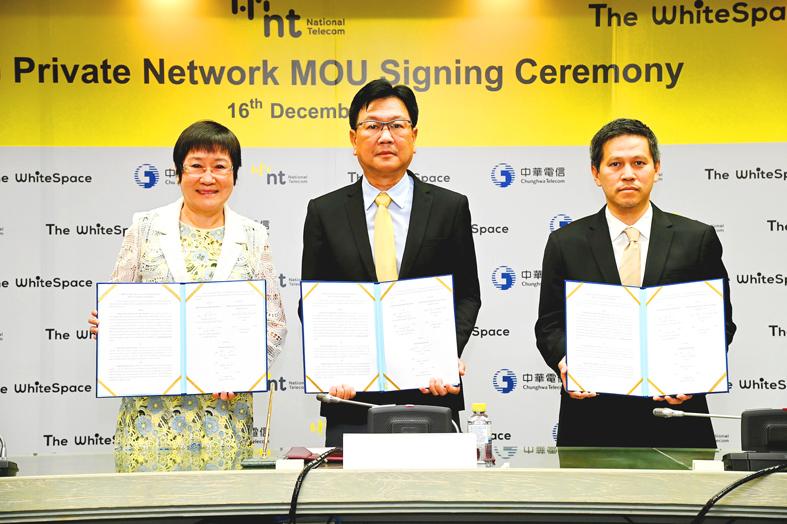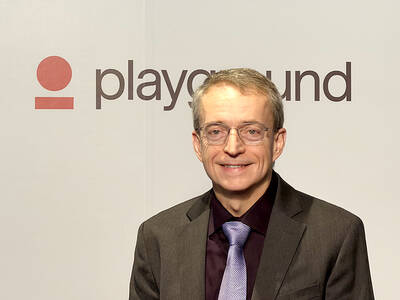Chunghwa Telecom Co (中華電信) has signed a memorandum of understanding with Thailand’s state-owned National Telecom PCL and WhiteSpace Co to build a 5G private network in collaboration with Delta Electronics (Thailand) PCL (泰達電), the companies said in a joint statement on Thursday.
It marks the latest effort by Chunghwa Telecom to expand its business in Southeast Asian after inroads into the Singaporean and Vietnamese markets.
The four-way cooperation would support the “Thailand 4.0” innovative manufacturing plan and assist the country in accelerating the adoption of 5G applications to introduce technologies such as the Internet of Things, artificial intelligence and big data, as well as increasing information security, they said.

Photo courtesy of Chunghwa Telecom Co
The firms would set up an augmented reality-based 5G private network that would be used for training assembly techniques, operational assistance and visual equipment control at two Delta facilities in the Bangpoo Industrial Estate near Bangkok, they said.
The project would also help realize innovative application services in the fields of smart manufacturing, remote collaboration and smart medical care, the firms said.
Chunghwa Telecom has been focused on expanding in Southeast Asia for a long time, seeking to “form alliances with high-quality international partners,” Chunghwa Telecom international business group president Sarah Wu (吳學蘭) said in the statement.
“We are convinced that through this cooperation, the company will reach a new milestone in the expansion of the ASEAN market, and usher in a new digital transformation service energy for Thailand and the ASEAN market,” she said, urging Taiwanese firms to join its efforts in the region.
National Telecom has obtained 5G licenses for operating 2,100 megahertz, 2,300 megahertz and 26 gigahertz frequency bands in Thailand. WhiteSpace is the country’s largest mobile virtual network service provider.

JITTERS: Nexperia has a 20 percent market share for chips powering simpler features such as window controls, and changing supply chains could take years European carmakers are looking into ways to scratch components made with parts from China, spooked by deepening geopolitical spats playing out through chipmaker Nexperia BV and Beijing’s export controls on rare earths. To protect operations from trade ructions, several automakers are pushing major suppliers to find permanent alternatives to Chinese semiconductors, people familiar with the matter said. The industry is considering broader changes to its supply chain to adapt to shifting geopolitics, Europe’s main suppliers lobby CLEPA head Matthias Zink said. “We had some indications already — questions like: ‘How can you supply me without this dependency on China?’” Zink, who also

The number of Taiwanese working in the US rose to a record high of 137,000 last year, driven largely by Taiwan Semiconductor Manufacturing Co’s (TSMC, 台積電) rapid overseas expansion, according to government data released yesterday. A total of 666,000 Taiwanese nationals were employed abroad last year, an increase of 45,000 from 2023 and the highest level since the COVID-19 pandemic, data from the Directorate-General of Budget, Accounting and Statistics (DGBAS) showed. Overseas employment had steadily increased between 2009 and 2019, peaking at 739,000, before plunging to 319,000 in 2021 amid US-China trade tensions, global supply chain shifts, reshoring by Taiwanese companies and

Taiwan Semiconductor Manufacturing Co (TSMC, 台積電) received about NT$147 billion (US$4.71 billion) in subsidies from the US, Japanese, German and Chinese governments over the past two years for its global expansion. Financial data compiled by the world’s largest contract chipmaker showed the company secured NT$4.77 billion in subsidies from the governments in the third quarter, bringing the total for the first three quarters of the year to about NT$71.9 billion. Along with the NT$75.16 billion in financial aid TSMC received last year, the chipmaker obtained NT$147 billion in subsidies in almost two years, the data showed. The subsidies received by its subsidiaries —

OUTLOOK: Pat Gelsinger said he did not expect the heavy AI infrastructure investments by the major cloud service providers to cause an AI bubble to burst soon Building a resilient energy supply chain is crucial for Taiwan to develop artificial intelligence (AI) technology and grow its economy, former Intel Corp chief executive officer Pat Gelsinger said yesterday. Gelsinger, now a general partner at the US venture capital firm Playground Global LLC, was asked at a news conference in Taipei about his views on Taiwan’s hardware development and growing concern over an AI bubble. “Today, the greatest issue in Taiwan isn’t even in the software or in architecture. It is energy,” Gelsinger said. “You are not in the position to have a resilient energy supply chain, and that,